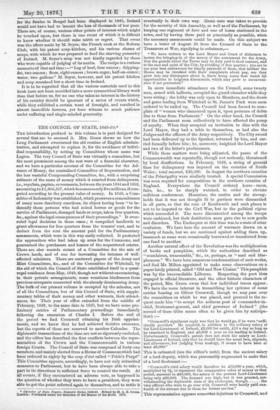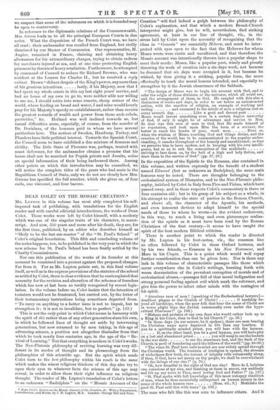THE COUNCIL OF STATE, 1649-50.*
THE introduction prefixed to this volume is in part designed for several that are to succeed it. Mrs. Green shows us how the Long Parliament overturned the old routine of English adminis- tration, and attempted to replace it, for the avoidance of indivi- dual responsibility, by setting up Committees whose name was Legion. The very Council of State was virtually a committee, but the most prominent among the rest were of a financial character, and we have a particular account of the Committee for the Ad- vance of Money, the centralised Committee of Sequestration, and the less wasteful Compounding Committee, &c., with a surprising estimate of the sums of money which it exacted from delinquents, i.e., royalists, papists, or recusants, between the years 1644 and 1652, amounting to £1,304,507, which becomes nearly five millions, if com- puted according to the present value of money. In 1649, a Com- mittee of Indemnity was established, which preserves a remembrance of many more desultory exactions, its object having been "to in- demnify those persons who had seized horses or goods for the service of Parliament, damaged lands or crops, taken free quarters, &c., against the legal consequences of their proceedings." It over- ruled legal decisions in these cases ; it compelled landlords to grant allowances for free quarters from the tenants' rent, and to deduct from the rent the amount paid for the Parliamentary assessments, which were in this way easily collected. It protected the apprentices who had taken up arms for the Commons, and guaranteed the purchasers and lessees of the sequestered estates. There are also records extant of a Committee for the sale of Crown lands, and of one for increasing the incomes of well. affected ministers. There are scattered papers of the Army and Mint Committees, &c., and of the Committee for Whitehall, by the aid of which the Council of State established itself in a quasi- regal residence from May, 1649, though not without encountering, in their private arrangements, some vexatious hindrances from previous occupants connected with the already domineering Army. The bulk of our present volume is occupied by the minutes, not of all the Committees, but of this Council of State, with supple- mentary tables of their money and other warrants, their attend- ances, &c. Their year of office extended from the middle of February, 1649, to the same date in 1650, but we have some pre- liminary entries of Parliamentary proceedings immediately following the execution of Charles L Before the end of the period we find Cromwell obtaining his Irish appoint- ments, and we know that he had achieved decisive successes, but the reports of these are reserved to another Calendar. The diplomatic transactions of the time are not so rigorously excluded, and the editor has described the first confficts between the repre- sentatives of the Crown and the Commonwealth in various foreign Courts. The Council of State was composed of forty-one members, and mainly elected from a House of Commons which had been reduced to eighty by the coup d'itat called "Pride's Purge." This Committee appears, accordingly, to have not only submitted measures to Parliament, but to have been always able to take a part in its directions in sufficient force to control the result. At all events, if they encountered an adverse vote, as happened in the question of whether they were to have a president, they were able to get the point referred again to themselves, and to settle it * Calendar of Slate Papers, Domestic Series, 164940. Edited by M. A. E. Green. London: Published under the direction of the Master of the Rolls. 1875.
eventually in their own way. Great care was taken to provide for the security of this Assembly, as well as of the Parliament, by keeping one regiment of foot and one of horse stationed in the town, and by having them paid as punctually as possible, when the necessary assessments could be made. On this subject we have a letter of August 21 from the Council of State to the Treasurers at War, signifying in substance,— " We have written to the Lord Mayor and Court of Aldermen to hasten the bringing-in of the money of the assessment for the Army, that the guards about the Tower may be duly paid to their content, and to the ease and quiet of the City, by avoiding of free quarter ; you are to use your best endeavours for timely payment of them, that neither the House may be troubled with their complaints about pay, nor they grow into any distempers about it, there being many that watch for opportunities to heighten discontents, which may grow to inconveni- ence if not prevented."
In more immediate attendance on the Council, some twenty men, armed with halberts, occupied the guard-chamber while they were sitting ; the lobby was only open to Members, and the doom and gates leading from Whitehall to St. James's Park were soon ordered to be nailed up. The Council had been forced to com- plain of "women who clamoured upon it, upon pretence of debts due to them from Parliament." On the other hand, the Council and the Parliament seem collectively to have affected the pomp of royalty. When they accepted an invitation to dine with the Lord Mayor, they had a table to themselves, as had also the Judges and the officers of the Army respectively. The City sword had been delivered up to the Speaker, returned by him, and car- ried formally before him ; he, moreover, knighted the Lord Mayor and two of the latter's predecessors.
While these matters were being adjusted, the peace of the Commonwealth was repeatedly, though not seriously, threatened by local disaffections. In February, 1649, a string of general fines for delinquency was imposed on the counties of South Wales ; total amount, £20,500. In August the northern counties of the Principality were similarly treated. A special Commission was soon required for compositions in the northern counties of England. Everywhere the Council ordered horse - races, fairs, &c., to be sharply watched, in order to obviate seditious conferences. Meantime, the castles and the strong- holds that it was not thought fit to garrison were dismantled in all parts, so that the ruin of Kenilworth and such places is not to be imputed to the Civil War, but to the political regime which succeeded it. The more discontented among the troops were cashiered, but their destitution soon gave rise to new perils and disorders. The Exchequer at this time was in a state of utter confusion. We have here the amount of warrants drawn on a variety of funds, but we are cautioned against adding them up, inasmuch as sums were occasionally borrowed or transferred from one fund to another.
Another natural effect of the Revolution was the multiplication of books and pamphlets, which the authorities described as "scandalous, treasonable," &c., or, perhaps, as "mad and blas- phemous." We have here numerous condemnations of such works, and find Mr. Milton appointed to make some observations on a paper lately printed, called " Old and New Chains." This pamphlet was by the irreconcilable Lilburne. Respecting the poet thus engaged in official literature, and the other historic characters of the period, Mrs. Green owns that few individual traces appear.
We have the more interest in transcribing her epitome of some entries bearing on Oliver Cromwell, though we may pass over- the committees on which he was placed, and proceed to the re-
quest made him "to accept the arduous post of commander-in- chief, lieutenant-general, and chief governor of Ireland" (the second of these titles seems often to be given him by anticipa- tion) :— " Cromwell's significant reply was that he would go, if he were 'suffi- ciently provided.' He required, in addition to the ordinary salary of the Lord-Lieutenant of Ireland, £3,000 for outfit, £10 a day as long as he remained in England, and £8,000 r- year on his landing in Ireland. Unfortunately Cromwell's patent does not state his salary as Lord- Lieutenant of Ireland, only that he should have the usual fees, stipends, and allowances, but judging from analogy, it seems to have been at least £5,000."
This is estimated (see the editor's note) from the ancient salary of a lord-deputy, which was presumably augmented to make that of a lord-lieutenant Cromwoll's total salary would therefore be £13,000 a year, which, multiplied by 3, to represent the comparative value of money at that period, amounts to £45,000, the salary of the present Lord-Lieutenant being only £20,000. The demand was high, but it was granted, not- withstanding the deplorable state of the exchequer, though. the very officers who were to go over with Cromwell were barely paid one- fourth of the arrears due to them for former service."
This representation appears somewhat injurious to Cromwell, and we suspect that some of the inferences on which it is founded may be open to controversy. In reference to the diplomatic relations of the Commonwealth, Mrs. Green leads us to all the principal European Courts in due -order. What the disposition of the French Court was, we have all read ; their ambassador was recalled from England, but civilly dismissed by our Master of Ceremonies. Our representative, M. Augier, remained in France, claiming and obtaining heavy allowances for his extraordinary charges, trying to obtain redress for merchants injured at sea, and at one time protecting English prisoners by threats of heavy retaliation. Furthermore, he attempted by command of Council to seduce Sir Richard Browne, who was resident at the Louvre for Charles H., but he received a reply valiant. Brown "did not despair of the King's power, anymore than
of his gracious intentions lastly, if his Majesty, now that I lad spent my whole estate in this my last eight years' service, and had no home of my own to go to, were neither able nor willing to use me, I should retire into some remote, cheap corner of the world, where feeding on bread and water, I and mine would hourly pray for his Majesty's speedy re-establishment, rather than receive the greatest rewards of wealth and power from those arch-rebels, parricides," &c. Holland was well inclined towards us, but casual difficulties arose, especially, of course, from the murder of Dr. Dorislaus, of the honours paid to whom we have several particulars here. The notices of Sweden, Hamburg, Turkey, and Flanders have little political interest Towards the Spanish Court, the Council seem to have exhibited a due mixture of firmness and civility. The little State of Florence was, perhaps, treated with scant deference, for the ambassador obtains a promise that his house shall not be searched for Popish priests and Jesuits, unless on special information of their being harboured there. Among other points on which this introduction may be consulted, we will notice the complete titles of the peers who had seats in the Republican Council of State, only we do not see clearly how Mrs. -Greene has specified the full number, which she gives us, of four earls, one viscount, and four barons.































 Previous page
Previous page